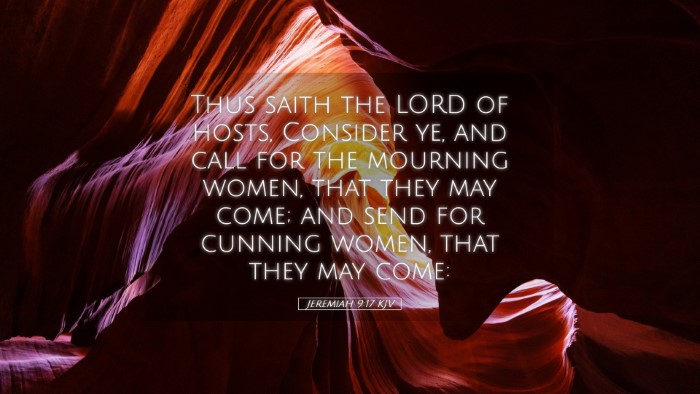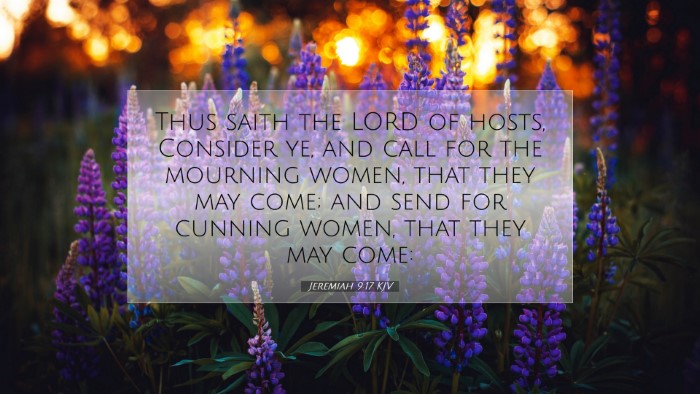Commentary on Jeremiah 9:17
Verse Context: Jeremiah 9:17 reads: “Thus saith the Lord of hosts, Consider ye, and call for the mourning women, that they may come; and send for cunning women, that they may come.” This verse forms a crucial part of Jeremiah’s lamentation over the sins of Israel, and serves to emphasize the impending judgment and the need for mourning over the spiritual decline of the people.
Summary of Commentaries
Matthew Henry’s Commentary
Matthew Henry highlights the call to mourning women, symbolizing the deep sorrow that accompanies the recognition of sin and its consequences. He notes that God instructs Jeremiah to summon those who are skilled in mourning—cunning women who can articulate the grief that the nation should feel for its transgressions. Henry views this as a divine call to repentance, underscoring the importance of sorrow for sin as a precursor to genuine redemption.
Moreover, Henry reflects on the collective nature of this mourning, which is not just individual but communal. The emphasis on women's roles in mourning is significant, as it showcases traditional cultural practices where women were often responsible for lamentation rituals. This can be seen as an invitation for all of Israel to engage deeply with the reality of their sinfulness.
Albert Barnes’ Notes on the Bible
Albert Barnes provides a detailed exposition on the necessity of invoking mourners. He interprets the call for mourning women as not merely a cultural tradition but as a prophetic act that underscores the gravity of the situation. Barnes explains that the Lord desires His people to recognize the seriousness of their sins and the dire consequences that follow. He conveys that calling for mourners demonstrates God's compassion; even in judgment, there is an opportunity for reflection and repentance.
Additionally, Barnes will likely mention the social implications of this verse, as it signifies a collective effort to confront sin and its ramifications. The act of mourning represents an acknowledgment of loss—not just of life, but of relationship with God. Barnes emphasizes that such public acts of mourning could lead to a deeper societal transformation and a communal turning back to God.
Adam Clarke’s Commentary
Adam Clarke approaches the passage by examining the cultural indications of mourning within ancient Israelite society. He elucidates the role of women in lamentations and how this particular instruction conveys both a cultural and theological significance. Clarke notes that their expertise in mourning illustrates an urgent need for sincere repentance and a heartfelt plea to God for mercy.
Clarke also discusses the broader theme of intercession in this passage, recognizing that the act of mourning serves as an appeal to God. He points out that true mourning, motivated by recognition of sin, can lead to an outpouring of grace from God. The specific mention of “cunning women” suggests the need for skilled intercessors who can articulate the grief of the people before God, further emphasizing the serious plight of Israel.
Theological Reflections
This verse encapsulates several profound theological themes relevant for pastors, students, theologians, and Bible scholars:
- The Importance of Mourning for Sin: The act of mourning signifies a deep acknowledgment of wrongdoing and an understanding of the holiness of God. It serves to draw believers into a responsive relationship with the Lord.
- Role of the Community: The collective aspect of this mourning highlights the church's responsibility to hold one another accountable and engage in communal reflection and repentance.
- The Nature of Intercession: The passage illustrates that intercession involves a deep sense of care for others, a willingness to mourn with those who mourn and to cry out to God on behalf of a straying community.
- Cultural Contexts of Grief: Understanding the cultural practices of ancient Israel enriches the contemporary application of this text, reminding readers of the significance of grief in their own contexts.
Contemporary Application
As modern readers reflect on Jeremiah 9:17, it becomes essential to consider how these themes are applicable today:
- Encouragement for Corporate Mourning: Church leaders can facilitate spaces for collective lament over societal issues, promoting a culture where grief for sin is openly expressed and processed.
- Engagement in Intercessory Prayer: The church is called to action, not only in personal prayer life but also in community prayer, seeking the power of God’s mercy and grace for a broken world.
- Recognition of the Spiritual Condition: Believers are challenged to assess their spiritual health and the state of the church, promoting genuine sorrow for neglecting God and His commandments.
- Embracing Grief as a Pathway to Repentance: Rather than avoiding grief, the faithful are encouraged to face it head-on, recognizing that it can lead to transformation and renewal.
Conclusion
In conclusion, Jeremiah 9:17 serves as a compelling invitation to acknowledge the weight of sin, call for communal mourning, and seek God’s mercy through genuine repentance. The insights provided by public domain commentaries enrich our understanding of this profound text, offering both historical context and practical application for today's church. As the body of Christ reflects on these calls to mourning, may it move towards a deeper relationship with God, rooted in humility and intercession. Through such endeavors, the church may find renewed strength to boldly proclaim the message of hope and redemption amidst a grieving world.


